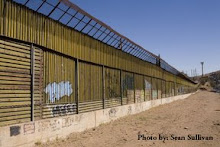By Scott Nicol
Newt Gingrich surged ahead of the pack in the South Carolina primary, soundly defeating his Republican rivals as the “anybody-but-Romney” contingent of the party appeared, for the moment, to have settled on him.
Hoping to show that he is serious about border enforcement, and to attract the voting bloc that abandoned Perry when they found out that he favored allowing undocumented students to pay in-state tuition, last fall Newt followed Michelle Bachmann’s lead and signed a pledge to line the southern border with double-layered border walls by 2013.
The pledge was written by Americans for Securing the Border, whose national chairman is the former chairman of the South Carolina Republican Party, Van D. Hipp Jr. Mr. Hipp’s push for enforcement of immigration laws is ironic, considering his own legal status. He is a convicted felon, who in 1997 pled guilty to accepting illegal campaign contributions. The Herald-Journal of Spartanburg, South Carolina, reported that, “In return for the guilty plea, the government dismissed a 14-count fraud and money laundering indictment stemming from operation of a phone sex business.”
Having lost his job with the Republican Party, Van D. Hipp is now a lobbyist and consultant for defense contractors who want to get work from the Department of Homeland Security. If Newt is elected and follows through on his promise it could mean a lot more business for Hipp’s clients.
To date, close to $3 billion has been spent on border walls. A mile of wall averages $ 7.5 million to build, though some cost much more. Levee-walls in Hidalgo County, Texas, cost $12 million a mile, with the Hidalgo County Drainage District ponying up $44 million, roughly a third of the cost. Walls through the rugged Otay Mountain Wilderness area cost $16 million per mile, and right now in San Diego $4.3 million is being spent to replace a section that runs for just 300 feet across the beach before plunging into the ocean.
650 miles, or around 1/3 of the southern border, already has either single-layered pedestrian walls or vehicle barriers. Adding another layer to the existing walls, replacing vehicle barriers with pedestrian walls, and building 1,300 miles of new wall would cost tens, and possibly hundreds, of billions more, at a time when Congress is trying to cut trillions from existing programs.
President Bush’s Secretary of Homeland Security, Michael Chertoff, oversaw the construction of most of the walls that now line the southern border. From that vantage he also saw the huge amounts of money that went into them. It is no surprise then that shortly after he left the Department of Homeland Security he founded the Chertoff Group, which helps big defense companies land Department of Homeland Security contracts. Many other top officials have quit DHS to join the Chertoff Group and cash in on their Homeland Security connections.
When the “underwear bomber” attempted to blow up a passenger plane a few months after he left DHS, former Secretary Chertoff granted dozens of interviews in which he gave advice on how the U.S. could prevent similar assaults. Again and again he said that full body scanners were the best solution. The Transportation Safety Administration, which falls under the umbrella of the Department of Homeland Security, subsequently required that airports install body scanners. Chertoff failed to mention in the first round of interviews that the company that made the body scanners was a client of the Chertoff Group. It is safe to assume that they were pleased with the return on their investment.
Hipp apparently hopes to emulate Chertoff and get his slice of the Homeland Security pie. Anything he can do to make that pie fatter, such as convincing the next president to commit to building more border walls, improves his odds of getting a piece. The hundreds of private landowners, and mile after mile of wildlife refuges, that the new walls would harm are of no more concern to Hipp than the 400 landowners whose property has already been taken or the damage walls have already inflicted on the Lower Rio Grande Valley National Wildlife Refuge were to Chertoff. In their eyes condemnations and habitat destruction are just the cost of doing business.
Of course those are costs paid by someone else; Chertoff and Hipp only reap the profits.
For Gingrich, signing Hipp’s border wall pledge is just good politics. On the one hand, it helps him look tough on immigration and border security. And following the Supreme Court’s Citizens United ruling, allowing corporations masquerading as people to spend unlimited sums on elections, cozying up to contractors who have made millions off of border security, and might like to see more contracts come their way, could prove to be quite lucrative.
Border walls are all about money and politics, not immigration or drug control. Kiewit does not have to refund the millions it was paid to build walls, even though those walls only take a couple of minutes to climb. Boeing gets to keep the huge sums that it received to build virtual fences that never worked. Like the phone sex business in the nineties, Homeland Security contracts are a sure-fire way for the unscrupulous to rake in big money, and Newt has pledged that if he is elected president the cash will keep on coming.
Monday, January 30, 2012
Newt Promises New Walls
Subscribe to:
Post Comments (Atom)



No comments:
Post a Comment